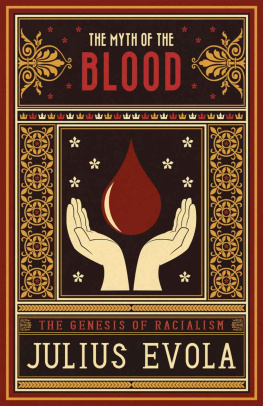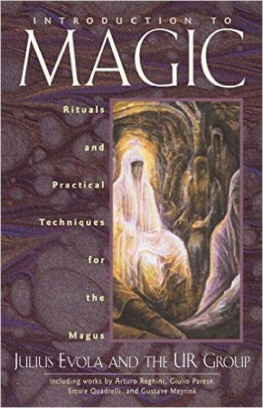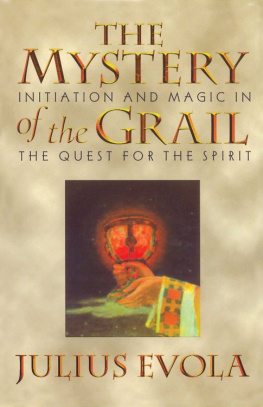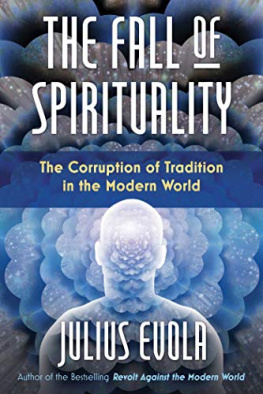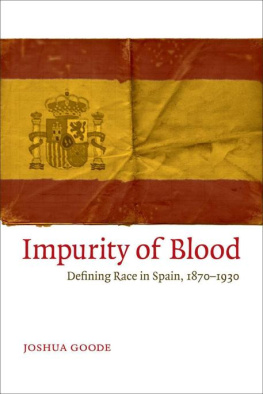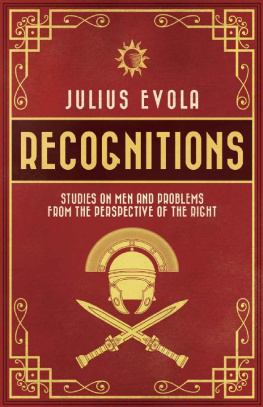.st0{fill:#1A1A1A;}.st1{fill:#B82527;}
ARKTOS
London 2018
Copyright 2018 by Arktos Media Ltd.
All rights reserved. No part of this book may be reproduced or utilized in any form or by any means (whether electronic or mechanical), including photocopying, recording or by any information storage and retrieval system, without permission in writing from the publisher.
Arktos.com | Facebook | Twitter | Instagram
Original Title
Il mito del sangue
ISBN
978-1-912079-42-1 (Softcover)
978-1-912079-41-4 (Hardback)
978-1-912079-40-7 (Ebook)
Translation
John Bruce Leonard
Editing
Martin Locker and John Bruce Leonard
Layout
Tor Westman
Cover Design
Andreas Nilsson
Translators Preface
T he Myth of the Blood was published twice by Julius Evola, the first time in 1937, and the second time, in a slightly expanded and redacted form, five years later in 1942. In the arc of that half decade much had happened, both in the world at large and in Evolas literary career, to warrant this double publication, and it is hardly superfluous of us to identify the principal of these events. This for the simple reason that The Myth of the Blood is in some ways a very peculiar book in the Evolian oeuvre , and one that demands a special explanation. One might be tempted to say on a superficial reading that it is a book in which Evola does not appear at all. He himself gives his purpose in it as follows: In the present volume we have set ourselves the task of presenting with the greatest objectivity the various motifs which, up to the advent of Germanic National Socialism, have nourished the racist current. That is a curiously scholarly aim for one of the great thinkers of the past century. One can countenance such a man striving for objectivity in his analysis of the works of another worthy thinkersay, a Gunon or a Jngerbut to see him stoop to grant his neutral gaze to men, many of whom are patently his inferior, one must certainly ask, wherefore? Was he not wasting his time? And perhapsours?
This objection appears all the stronger, since Evola, in the time between the publication of the two editions of The Myth of the Blood , published yet another work on racethis time a most Evolian study which seeks in a piercing and metaphysical fashion to get to the bottom of the racial question in its deepest and most essential elements, and which submits simultaneously a powerful critique of the false directions and blind alleys into which racism in Evolas day (and, we might well add, in our own) tended to stray. This second work, Synthesis of the Doctrine of Race , can be taken as Evolas final judgement on the question of race. Yet Evola considered his Synthesis , as he himself states in the Introduction of that work, the second half of the Myth of the Blood one therefore predicated on, following on, fundamentally dependent on, the present book. The Myth of the Blood was indeed so important to this progression, that Evola saw fit to republish it shortly after the first issuance of his Synthesis , and this time specifically with an eye toward his Synthesis . The present work, we might say, was the preparation for Evolas final statement on race . But in what way? Or, put otherwise, why did Evola feel the need to dedicate himself to such a scholarly task of merely presenting ideas that were not his own, before he could dedicate himself to what was surely his loftier and more characteristic task, of winnowing these ideas out and giving the best of them depth and meaning?
By his own proclamation on this score:
The task that we propose to ourselves in this work is to trace a kind of genesis of racism, or, better say, of the various motifs which figure in it, after having clearly defined their meaning; we wish to give a sense to the wellsprings that have nourished this myth, of the influences which have gradually favored its formation and affirmation in the most recent history. [Introduction of 1942]
Several points emerge from this. In the first place, The Myth of the Blood , despite its appearance as a somewhat technical recapitulation of the thought of other men, in truth is anything but. It is, in point of fact, a genealogy in the original sense of the word, a work dedicated to exposing the antecedents of an idea which Evola considered so important that it might be capable of affirming, against [the materialistic, democratic, rationalistic] conception, the value of blood, of tradition, of race, perhaps even to such an extent that racism might have the meaning of restoration and of recovery of higher values ( Myth of the Blood , Conclusion). One can pass no judgement on these matters, save as one has due clarity on them; objective investigation into the origins necessarily precedes any objective determination of the value of the ideas that stem from these origins. This genealogical work was therefore considered by Evola to be of special importance on account of two related factors: first, the unique, inimitable promise possessed by the idea of race; and second, the ease with which that same idea might be spoiled or miscarried.
This returns us to the historical question, the question of what had been happening in Evolas time, such that he supposed the necessity of publishing not one, but two books on race in a very brief period of time. The most striking historical developments, without doubt, were surely the emergence of the German-Italian Axis in the year preceding the first publication of this book on the one hand, and both the Italian Manifesto of Race (a slipshod piece of work, as Evola calls it in The Path of Cinnabar ) and the decree on the Racial Laws in the year following it on the other. The Racial Laws were modeled explicitly on National Socialist legislation, to such an extent that some have supposed they should never have seen the light of day, had it not been for Italys alliance with Germanya thesis, incidentally, with which Evola disagreed. Evola held that these laws were necessary in Italy principally due to the Italian Empire which was emerging in Africa; they were needed to establish a pathos of distance on the part of the Italians in their dealings with the Africans.
Be that as it may, the introduction of these laws marks a most sensitive moment in the history of Fascismone of those decisive moments in which an idea of great price first makes its appearance in a peoples spirit, and everything suddenly hinges on how that idea will be interpreted . Evola threw himself to the task of making this concept of race show its higher qualities, by molding it, rectifying it, directing it in the right way, imprinting it with all his marvelous talents of clarification, so as to make it the carrier of a recovery of a spiritual heritage which we have forgotten (see his Conclusion)a heritage capable, perchance, of carrying modern man toward that Traditionalist Order which Evola never ceased to seek with all the power at his disposal.
It seems indeed that his call was not without answer; after the publication of his Synthesis no lesser a figure than Mussolini himself contacted Evola, praising Evolas work and expressing his fervent hope that Evolas ideas might give rise to a specifically Italian doctrine of race, which could inform the Fascist regime and, as Evola put it, elevate the Italian people. This was complicated by the outraged response of certain Italian Catholics and vulgar racists upon learning that Mussolini had been in contact with the Baron; they set about obstructing a rapport between the two men in every way possible.
Enough; that is a drama, as we well know, which was not permitted to play out to the end. The plot was interrupted violently and conclusively by a diabolus ex machina , and the Evolian project was brought with it to a ruinous and premature halt; nor can we say how it might have unfolded had it been permitted its due life. But in the same breath, let us respire hope as much as sadness; for in truth, in our day, that attempt is being reborn
Next page
